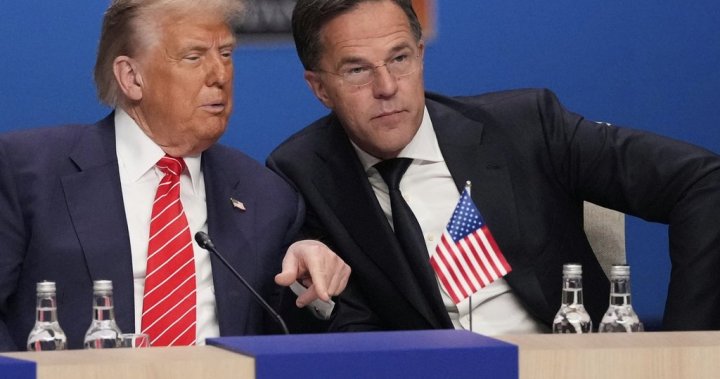After months of uncertainty surrounding U.S. military aid to Ukraine, former President Donald Trump is set to meet with Dutch Prime Minister Mark Rutte at Mar-a-Lago tomorrow. This high-stakes encounter marks Rutte’s strategic pivot from outgoing NATO Secretary-General Jens Stoltenberg to the man who could soon reclaim the White House.
Standing on the tarmac in Brussels yesterday, I watched as Rutte’s delegation prepared for departure. “This is no ordinary diplomatic call,” confided a senior Dutch foreign ministry official who requested anonymity. “We’re trying to secure commitments before the November election potentially reshapes the entire Western alliance.”
The meeting comes as European leaders grow increasingly anxious about the future of Ukraine support under a potential second Trump administration. Just last week, Trump criticized the additional $61 billion Ukraine aid package that finally cleared Congress after months of Republican resistance. “They’re giving money that we’re going to have to go out and borrow,” Trump complained during a Pennsylvania campaign rally.
Rutte brings significant leverage to Florida. The Netherlands recently announced a €500 million military support package for Ukraine, bringing their total commitment to over €2.6 billion since Russia’s February 2022 invasion. More importantly, the Dutch government last month agreed to purchase 14 million artillery shells for Ukraine in partnership with the Czech Republic.
“Europeans are stepping up precisely because American support has become unpredictable,” explains Dr. Elisabeth Braw, senior fellow at the American Enterprise Institute. “This meeting represents the new reality where European powers must negotiate directly with potential future presidents, not just current administrations.”
The ammunition initiative, which Dutch Defense Minister Kajsa Ollongren described as “absolutely essential for Ukraine’s defense,” addresses Ukraine’s most critical battlefield shortage. Ukrainian commanders report firing just 2,000 artillery shells daily, compared to Russia’s 10,000, according to military intelligence assessments from the Ukrainian Defense Ministry.
Walking through Kyiv’s government quarter last month, I witnessed firsthand the consequences of this disparity. Air raid sirens punctuated my conversation with Andriy Yermak, President Zelensky’s chief of staff, who didn’t mince words: “Without shells, we cannot hold territory. Without territory, we cannot negotiate. It’s that simple.”
Rutte’s visit also highlights Trump’s complicated relationship with NATO. While Trump has consistently criticized European defense spending, the former president’s recent suggestion that Russia should “do whatever the hell they want” to NATO allies who don’t meet spending targets alarmed Brussels and beyond.
The Netherlands, however, stands on firmer ground than most. The country hit the NATO 2% GDP defense spending target last year for the first time in decades – a point Rutte will undoubtedly emphasize to Trump, who has made allies’ defense contributions a cornerstone of his foreign policy messaging.
Beyond funding disputes, Trump’s Mar-a-Lago meeting agenda likely includes his controversial views on ending the conflict. The former president has repeatedly claimed he could negotiate peace within 24 hours of returning to office, though details remain scarce.
“Trump believes in deals, not prolonged conflicts,” said Bryan Clark, senior fellow at the Hudson Institute. “Rutte will try to convince him that strengthening Ukraine’s position now creates better conditions for any future negotiations, whether they happen under Biden or Trump.”
Inside the White House, current administration officials watch the Rutte-Trump meeting with unease. “We’re in uncharted territory,” a National Security Council staffer told me on condition of anonymity. “Having former presidents conducting shadow diplomacy undermines our unified front, especially on Ukraine.”
The meeting highlights a growing trend of European leaders hedging their bets on U.S. election outcomes. Earlier this month, British Foreign Secretary David Lammy met with several Republican lawmakers, while German Chancellor Olaf Scholz reportedly instructed his team to establish contact with Trump’s foreign policy advisors.
Meanwhile, in the trenches of eastern Ukraine, soldiers express frustration with the political maneuvering. “While they talk in luxurious palaces, we’re dying because ammunition arrives too late,” said Lieutenant Oleksandr Fedorenko during my embed with his unit near Avdiivka in March.
For Rutte, who steps down as Prime Minister on July 2 to potentially assume NATO leadership, tomorrow’s meeting represents both personal and strategic diplomacy. “He needs to show he can work with Trump if he wants the Secretary-General position,” notes Jan Techau, director of the Europe Program at the German Marshall Fund.
As Trump and Rutte shake hands tomorrow, Ukrainian President Volodymyr Zelensky will be watching closely from Kyiv. With his forces losing ground in the east and Russia launching new offensives, the outcomes of this Florida meeting could shape Ukraine’s battlefield reality long before Americans head to the polls in November.






